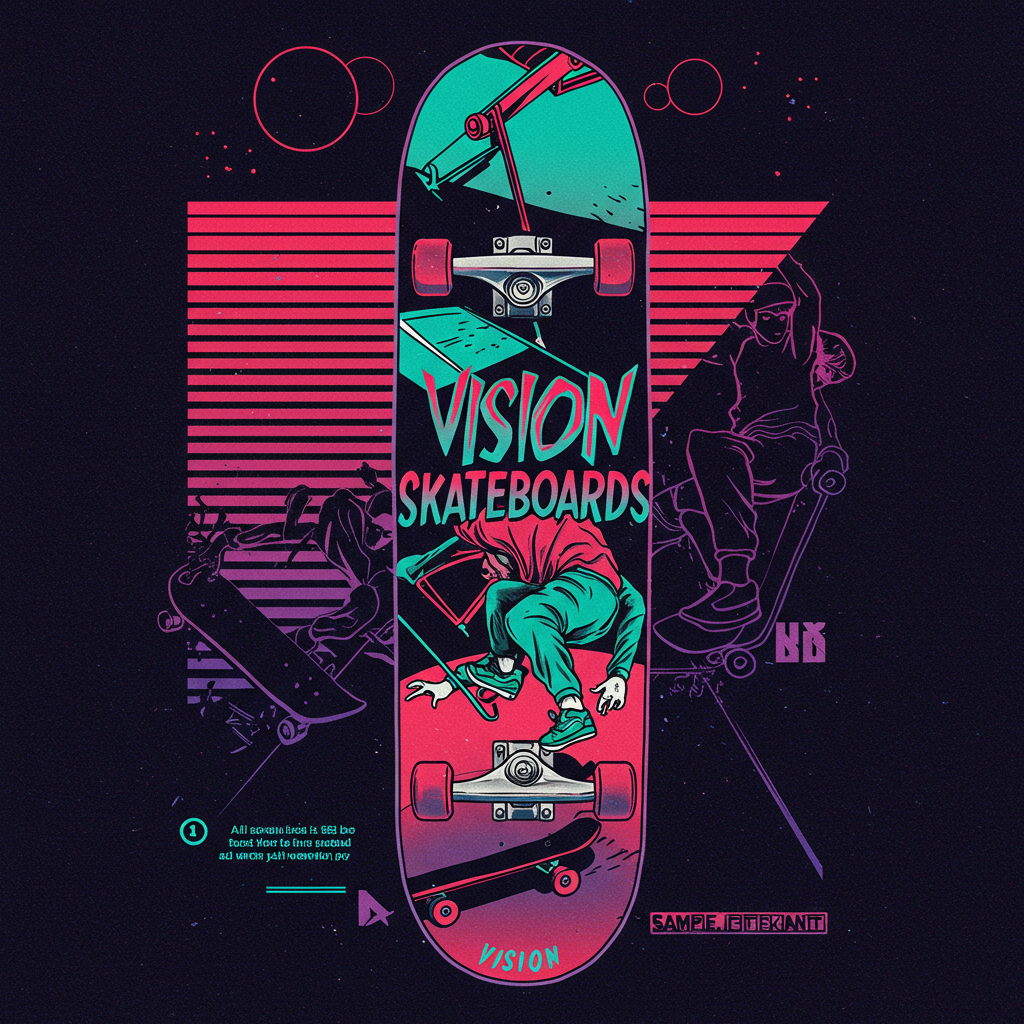
Vision Skateboards
Share
The Enduring Legacy of Vision Skateboards
Vision Skateboards stands as a pivotal figure in the annals of skateboarding history, a brand that not only produced iconic decks and apparel but also significantly shaped the culture and aesthetic of the sport, particularly during its explosive growth in the 1980s. Founded in 1976 by Brad Dorfman, Vision evolved from humble beginnings in skate apparel to become a dominant force, influencing generations of skaters through innovative designs, strategic sponsorships, and a keen understanding of the burgeoning youth market.
The genesis of Vision can be traced back to Lou Ann Lee, Dorfman's sister, who began crafting durable skate shorts called "Mad Rats" in her garage. This initial foray into skate-specific soft goods laid the groundwork for Dorfman's entry into the industry. Recognizing an opportunity, Dorfman expanded into distributing these shorts and soon introduced the "Space Plate," a plastic skid plate for skateboard tails. The success of these accessories propelled Vision into skateboard manufacturing. Brad Dorfman chose the name "Vision," and the brand quickly distinguished itself, moving beyond generic boards to create innovative designs.
The true ascent of Vision Skateboards began with its association with influential riders. While some sources mistakenly credit Mark Gonzales as the founder, it was his pivotal role as a sponsored professional, alongside other legends like Mark "Gator" Rogowski, that catapulted Vision into the mainstream. Rogowski's signature board, in particular, became immensely popular, cementing Vision's status among young skaters. Vision's roster of sponsored athletes also included other notable figures such as Tony Alva, Steve Caballero, Rodney Mullen, and Matt Hensley, all of whom contributed to the brand's image and reach.
Vision's product innovations were equally impactful. The brand was among the first to introduce a double concave board and the "Vex Cave" design, which enhanced board strength. They also pioneered rounded rails on decks. However, perhaps the most enduring legacy of Vision's product line is its iconic graphics. The "Psycho Stick," designed by Andy Takakjian, became an instantly recognizable symbol of 1980s skateboarding, its bold and colorful artwork reflecting the vibrant energy of the era. Mark Gonzales' pro model decks, featuring his distinctive artwork, also became highly sought-after collector's items, further solidifying Vision's artistic and cultural footprint.
Beyond hard goods, Vision's expansion into apparel through "Vision Street Wear" was revolutionary. Recognizing the desire of skaters for clothing that reflected their identity, Vision became the first dedicated skateboard clothing company. Vision Street Wear exploded in popularity, with its distinctive logo and designs appearing on shoes, shirts, hats, and jackets, becoming a ubiquitous sight in skate parks and beyond. This venture was so successful that it transcended the skateboarding world, attracting attention from mainstream fashion publications and being dubbed "Mondo Vision."
The 1980s were a golden era for Vision. The company's influence extended to video production with the formation of Unreel Productions, releasing seminal skate videos like "Skate Visions" (1984) and the widely remembered "Psycho Skate" (1988). Vision also hosted significant events, such as the 1987 Vision Pro Contest, which drew thousands of spectators and showcased the sport's growing popularity.
However, as the 1980s drew to a close, Vision faced challenges. The skateboarding landscape began to shift, with a growing emphasis on street skating over the vert riding that had been Vision's primary focus. The brand was slow to adapt, and some of its key riders, including Mark Gonzales, eventually departed to form new companies like Blind Skateboards, a name chosen as a subtle jab at his former employer. Vision Street Wear also experienced rapid growth that became difficult to manage.
Despite these setbacks, Vision Skateboards has endured. While its peak influence may have been in the 1980s, the brand's iconic designs and legacy continue to resonate. Vision has seen reissues of its classic decks, catering to both nostalgic older skaters and new generations discovering the brand's historical significance. Today, under Select Distribution, Vision continues to produce skateboards and equipment, maintaining its commitment to quality and innovation while preserving its rich heritage.
In conclusion, Vision Skateboards was far more than just a manufacturer; it was a cultural touchstone that helped define an era of skateboarding. Through its pioneering designs, influential team riders, and groundbreaking foray into streetwear, Vision left an indelible mark on the sport's identity, aesthetics, and commercial landscape. Its history is a testament to the dynamic evolution of skateboarding, a journey from garage-based beginnings to a global phenomenon, with Vision Skateboards firmly etched into its foundational narrative.
